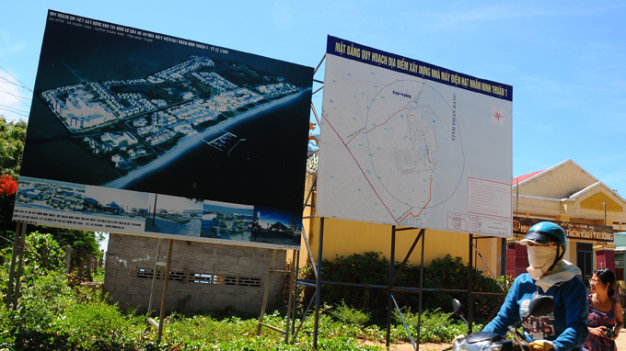A committee under Vietnam’s lawmaking National Assembly on Thursday approved a government proposal to pull the plug on a megaproject to build two nuclear power plants in a south-central province.
The Vietnamese government’s decision to scrap the Ninh Thuan nuclear power project, consisting of two planned plants, Ninh Thuan 1 and 2, in the namesake province, came in the wake of rising costs and concerns that the ambitious plan has “lost its feasibility.”
The proposal to terminate the project was submitted to the National Assembly for approval on Thursday, with the legislature’s Committee on Technology, Science and Environment eventually giving the government a go-ahead.
“Scrapping the project is a brave decision from the government,” deputy head of the committee Le Hong Tinh told Tuoi Tre (Youth) newspaper on the sidelines of yesterday’s meeting.
Under the government’s ambitious plan, the Ninh Thuan 1 and 2 facilities, once put into operation, would have been Vietnam’s first nuclear power plants.
The two plants are among five nuclear power facilities slated for construction in Vietnam’s central region between 2020 and 2030 under a plan approved by the government in response to forecasts that the country will face a serious power shortage by 2020.
“The estimated investment for the project has doubled,” Tinh said, citing rising costs as the biggest reason behind the decision to scrap the plan.
“The project was initially estimated to cost VND200 trillion [US$8.93 billion], but the cost rose to VND400 trillion [$17.86 billion] and may have kept rising,” he elaborated.

Tinh attributed the rising cost to the fact that Vietnamese officials demanded more modern and advanced technology to be used at the planned plants, in the wake of the 2011 Fukushima nuclear disaster in Japan.
“With the doubling cost, the project is no longer profitable and the investment is ineffective,” Tinh said.
“Even when the two plants eventually came into commission the electricity they produced would also have been twice as expensive as planned.”
Tinh added that the Ninh Thuan nuclear power project was developed at a time when Vietnam’s economy expanded at an annual pace of 7 to 8 percent.
“As GDP grows, so does the demand for electricity. The nuclear power project was planned to embrace the rising power demand,” Tinh said.
“But reality shows that GDP growth actually only 6 to 7 percent.”
With the government’s proposal already backed by the legislature’s science committee, lawmakers are scheduled to reconvene on November 22 to release a resolution that will officially put an end to the project.
 Le Hong Tinh
Le Hong Tinh
The Ninh Thuan nuclear project had been under construction for seven years before government authorities gave up on it.
In 2009 the megaproject was green-lit by the National Assembly, with the estimated cost of VND200 trillion. At that time, Russian partners pledged to lend Vietnam $10.5 billion to fund the project, while Japan also pledged ODA loans.
In 2010 the Vietnamese government selected Russia as the technology partner of the Ninh Thuan 1 plant, and chose Japan for the second plant the following year.
The project was initially planned for groundbreaking in 2015 and commissioned in 2020, but the timeline was extended in 2014 before the government decided to completely cease implementation of the project.
Tinh added it is still better to cease the project than to continue putting more money into the facility or importing machinery and equipment only to have them collect dust.
“Looking to other places in the world, such countries as South Africa and Germany have had to scrap nuclear power plant projects, even after everything had been completed.
Like us on Facebook or follow us on Twitter to get the latest news about Vietnam!





















































